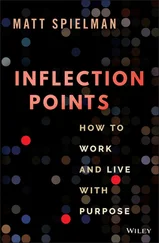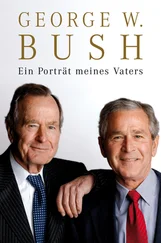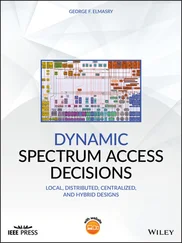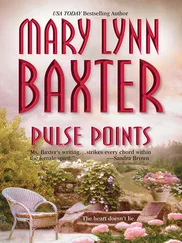The decisive vote came on November 21, 2003. Laura and I had long been scheduled to spend that day in Great Britain, as part of the first official state visit there by an American president since Woodrow Wilson. Some suggested postponing the trip. I refused. “They have phones in London, you know,” I reminded the team.

Laura and I enjoyed spending time with Queen Elizabeth II, a gracious, charming woman with a keen sense of humor. In 2007, Her Majesty and Prince Philip came to celebrate the four hundredth anniversary of the Jamestown settlement. In my welcoming remarks before seven thousand people on the South Lawn, I thanked the queen for her long friendship with America. “You helped our nation celebrate its bicentennial in 17 …” I caught myself before I could finish the date, 1776, a rough year in U.S.-British relations and an unflattering commentary on the queen’s longevity. The eighty-one-year-old monarch glanced at me with a wry smile. “She gave me a look that only a mother could give a child,” I said. At a dinner at the British embassy the next night, Her Majesty said, “I wondered whether I should start this toast by saying, ‘When I was here in 1776 …’ ”
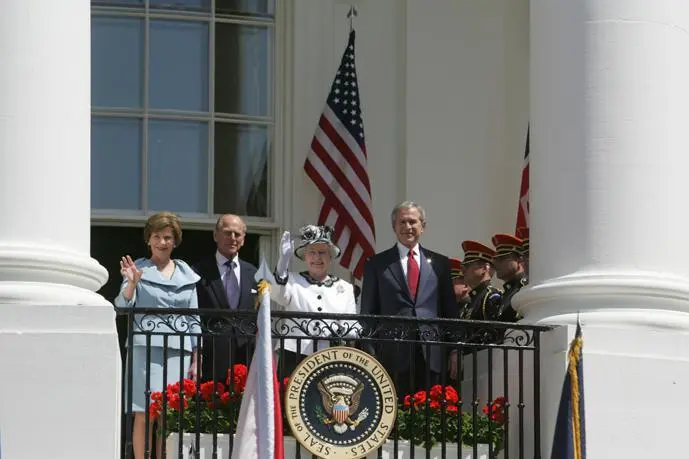
With Queen Elizabeth and Prince Philip. White House/Joyce Boghosian
Queen Elizabeth’s hospitality at Buckingham Palace during our 2003 state visit was exquisite. We received a forty-one-gun salute, inspected the royal troops in the courtyard, and slept in the immaculately appointed Belgian Suite. Our room had been occupied by Queen Elizabeth’s uncle, King Edward VIII, before he abdicated the throne in 1936 to marry an American divorcée. It included a three-hundred-year-old mirror, some 10 million British pounds’—$15 million—worth of antiques, and a beautiful view of the palace gardens. At our afternoon tea with Her Majesty and Prince Philip, I asked the queen about her dogs. A few minutes later, a royal footman appeared with her famous corgis. They were friendly and polite. My only hope was that if Barney ever met the queen, he would behave as well as they did—and not bark for Scottish independence.
That evening, Her Majesty and Prince Philip gave an elegant state banquet in our honor. Our places were set with ten pieces of silverware and seven crystal wine goblets. Evidently, word hadn’t reached the royal pantry that I had quit drinking. Before I stood to make my toast in white tie and tails, I looked over at Laura in her beautiful burgundy gown. I wondered if she was thinking what I was: We’ve come a long way from that backyard barbecue in Midland.
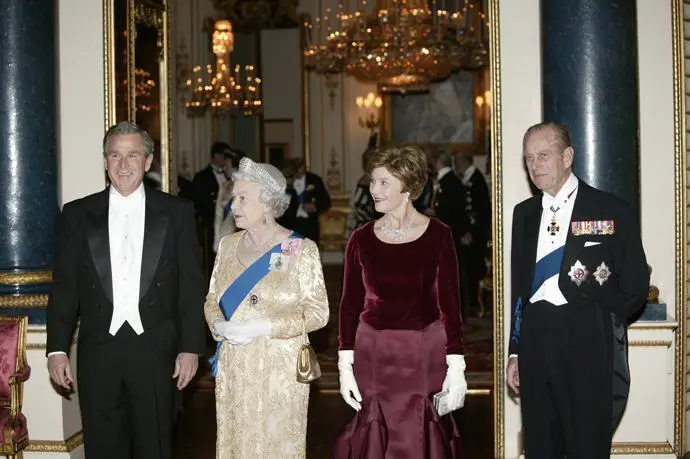
At Buckingham Palace. White House/Eric Draper

The stateliness of Buckingham Palace marked a stark contrast to what awaited on the flight home. As Air Force One took off, legislative director David Hobbs called me with a list of about a dozen wavering House members, mostly conservatives. I started dialing for votes over the Atlantic. Several congressmen were unavailable to take my call. One junior member did answer. “I didn’t come to Washington to increase the size of government,” he told me.
“You know what, I didn’t, either,” I answered. “I came to make sure the government works. If we’re going to have a Medicare program, it ought to be modern, not broken.”
“This is just another entitlement that will keep growing forever,” he said.
“So are you for abolishing Medicare?” I responded. “This is an opportunity to introduce competition into the system and hold down costs. Just so you know, this is a helluva lot better deal than you’re going to get from any other president.”
He wasn’t persuaded. When I landed in Washington, I made another round of calls. We were making some headway, but it was going to be tight. When the House voted at 3:00 a.m., the initial count came up short. Speaker Denny Hastert took the rare step of holding the vote open in the hope he could persuade a few congressmen to change their votes. Just before 5:00 a.m., David Hobbs woke me up with a call from the Capitol. “We need two more votes,” he said. “Can you talk to a few more members?”
He passed his cell phone around to several Republicans who might be persuaded to change their minds. I argued the case as best I could, given my jet lag. David called back a little while later. Miracle of miracles, the House had passed the bill, 220 to 215. The Senate followed a few days later. I signed the Medicare Modernization Act of 2003 on December 8, 2003, at Constitution Hall. Behind me on the stage was a group of seniors who would benefit from the new law. One was Mary Jane Jones, the woman from Virginia who had to reuse her needles to afford insulin. The prescription drug benefit would save her an estimated $2,700 a year.
The new law called for the prescription drug benefit to take effect on January 1, 2006. Skeptics said that seniors would have trouble picking from all the competing private options. I disagreed. I believed that seniors were plenty capable of making decisions about their lives, and that the government ought to trust them to do so.
My effective secretary of health and human services, Mike Leavitt, worked with Medicare Administrator Mark McClellan and his team on a massive public outreach campaign. It paid off. More than 22 million seniors signed up for a prescription drug benefit during the initial five-month enrollment period. In a 2008 survey, 90 percent of Medicare prescription drug recipients—and 95 percent of low-income beneficiaries—said they were satisfied with the program.
Ultimately, Medicare modernization was a tradeoff. We created a needed new benefit but spent more money than I wanted. We introduced market-based competition among private drug plans, but we were unable to use the new benefit as leverage to move more seniors from government-run Medicare to private Medicare Advantage plans. We created health savings accounts, but we could not convince Congress to require government-run Medicare to compete on a level playing field with private plans.
By the time I left office, more than 90 percent of Medicare beneficiaries had coverage for prescription drugs. Ten million were enrolled in private-sector health-care plans through Medicare Advantage. Almost seven million Americans owned health savings accounts, more than a third of whom had not previously owned health insurance.
Thanks to competition between private-sector plans, the average monthly premium for prescription drug coverage dropped from an initial estimate of $35 to $23 the first year. By 2008, the initial estimate of $634 billion had dropped below $400 billion. The Medicare prescription drug benefit became one of the few government programs ever to come in well under budget. Market forces had worked. And we had moved America’s health care system in the right direction: away from government control and toward the choices and competition of a private market system, which is the best way to control costs in the long run.

“I’m optimistic,” I told Dad as we hunted quail in South Texas on New Year’s Day, 2004. “This election is going to come down to who knows how to lead, who will take on the big issues, and who can keep America safe.”
Dad was concerned. For months, he had watched the Democratic presidential candidates take swings at me every day. The poundings were having an impact. My approval ratings had topped 90 percent after 9/11 and 75 percent after the liberation of Iraq. By the end of 2003, I had dropped to the fifties in some polls. Dad had seen the pattern before. His approval rating had skyrocketed in 1991, then crashed before the 1992 election.
Читать дальше









